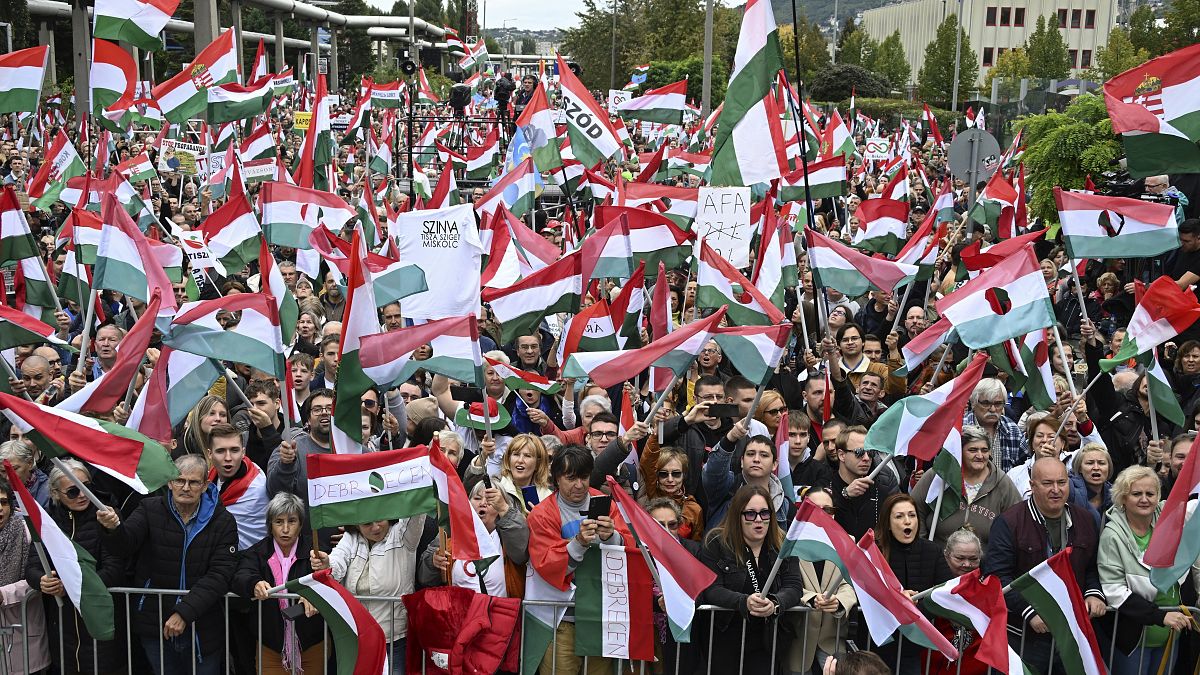In Hungary, thousands of protesters gathered outside the headquarters of the country’s public media corporation to demonstrate against what they view as a propaganda network operated by the nationalist government at the expense of taxpayers. The protest was organized by Péter Magyar, the leader of the TISZA party, which has emerged as a serious political challenge to Prime Minister Viktor Orbán’s ruling Fidesz party. Magyar, whose party received nearly 30% of the vote in European Union elections and is polling closely to Fidesz, criticized Orbán’s “propaganda factory” for damaging Hungary’s democracy. He called for an end to the lies and propaganda while demanding the resignation of the public media director.
Hungarian and international observers have long warned about threats to press freedom in Hungary, with Orbán’s party using media buyouts by government-connected business tycoons to build a pro-government media empire. Reporters Without Borders estimates that Orbán’s party controls around 80% of Hungary’s media market resources. In 2021, Orbán was labeled a media “predator” by the group, the first EU leader to receive such a designation. Protesters, like Balázs Tömpe, highlight the unbalanced and misleading nature of the government propaganda that dominates the publicly financed media, leading to a lack of alternative voices and viewpoints.
One protester, Ágnes Gera, a retired teacher from southern Hungary, expressed concern about the censorship of dissenting voices in public media, limiting access to information about political alternatives for Hungarians. Many opposition politicians have also raised concerns about the lack of opportunities to appear on public television to communicate with voters, further exacerbating the one-sided narrative put forth by the government. Magyar and his supporters are planning another demonstration on October 23, a national holiday commemorating Hungary’s failed revolution against Soviet domination in 1956, to continue their calls for change and accountability.
The ongoing protests in Hungary highlight the growing dissent against the government’s control over the media and the suppression of opposing voices. Magyar and the TISZA party represent a significant challenge to Orbán’s Fidesz party, with increasing support from voters and a strong stance against what they view as destructive propaganda tactics. The demonstration outside the public media headquarters is a response to the widespread perception that the government uses taxpayer-funded resources to spread misinformation and manipulate public opinion. By demanding transparency, accountability, and the opportunity for diverse voices to be heard in the media landscape, protesters are pushing for a more democratic and inclusive society in Hungary.
As Magyar and his supporters continue to rally against the government’s propaganda machine, the international community is also taking notice of the threats to press freedom in Hungary. Media watchdogs have warned about the dangers of allowing one party to dominate the media landscape, as it stifles critical voices and limits the public’s access to diverse perspectives. The labeling of Prime Minister Orbán as a media “predator” underscores the serious concerns about the state of media freedom in the country. Moving forward, it will be important for Hungarian authorities to address these issues and uphold the principles of a free and independent press for the benefit of all citizens.
In conclusion, the protests in Hungary led by Péter Magyar and the TISZA party represent a pivotal moment in the country’s struggle for media freedom and democratic values. The calls for accountability, transparency, and a more diverse media landscape reflect a growing dissatisfaction with the government’s control over public information. As Magyar and his supporters prepare for further demonstrations, the international community will be closely watching to see how Hungary addresses these pressing concerns. By standing up against government propaganda and advocating for a more inclusive society, the protesters in Hungary are sending a powerful message about the importance of safeguarding press freedom and promoting a vibrant democracy for all.











